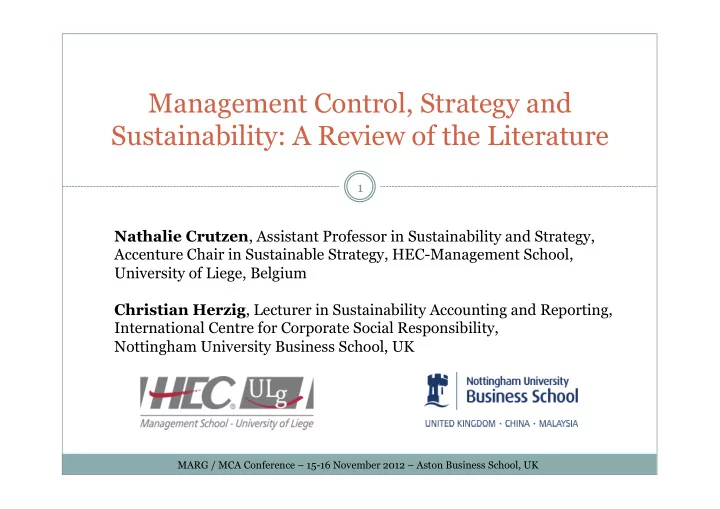

Management Control, Strategy and Sustainability: A Review of the Literature 1 Nathalie Crutzen , Assistant Professor in Sustainability and Strategy, Accenture Chair in Sustainable Strategy, HEC-Management School, University of Liege, Belgium Christian Herzig , Lecturer in Sustainability Accounting and Reporting, International Centre for Corporate Social Responsibility, Nottingham University Business School, UK MARG / MCA Conference – 15-16 November 2012 – Aston Business School, UK
Introduction 2 Objective – to review the literature on the relationship between management control, strategy and sustainability (organisation of the literature, state of our current knowledge, future research directions) Motivation o Key role of (sustainability) management control systems in shaping processes of (sustainability) strategy formulation and implementation is widely acknowledged (e.g. Simons, 1990; Langfield-Smith, 1997; Berry et al, 2009; Epstein and Wisner, 2005; Gond et al. 2012) o A growing body of literature on management control, strategy and sustainability has emerged over the last years and calls for further research have been made (e.g. Parker, 2000; Burritt, 2004; Chung and Parker, 2008; Durden, 2008) o Practical need to further embed sustainability into organisations and challenges in translating strategic aspirations for sustainability into practice (e.g. CIMA and Accenture Research 2011) Nathalie Crutzen / Christian Herzig – MARG & MCA Conference, 15-16 November 2012
Key concepts 3 Management control Formal and informal mechanisms, processes, systems, and networks used by organizations for conveying the key objectives and goals elicited by management, for assisting the strategic process and on-going management through analysis, planning, measurement, control, rewarding, and broadly managing performance, and for supporting and facilitating organizational learning and change (Ferreira and Otley,2009) Strategy Direction and scope of an organisation over the long term, which achieves advantage in a changing environment through its configuration of resources and competences with the aim of fulfilling stakeholders’ expectations (Johnson, 1987) Sustainability / CSR Broadly defined: responsible, ethical, social, environmental, sustainable; with links to the strategic measurement, control and management of the interaction between business, society and/or the environment (Bennett and James, 1997) Nathalie Crutzen / Christian Herzig – MARG & MCA Conference, 15-16 November 2012
Research design 4 Iterative approach 1. Definition of keywords (see Appendix); 2. Keyword-based search on databases (EBSCO, Pro Quest ABI/Inform Global); 3. Review of abstracts and papers to select relevant articles; 4. Analysis of referencing section to identify further key articles (as well as books and book chapters); 5. Refinement and completion of the selection of papers. Initially, more than 70 papers selected for review Difficulties o « Emerging » association which can be studied through various disciplinary lenses o No-generally-accepted definitions of the concepts o Implicit links between ‘MC, Strategy and Sustainability’ o Stakeholder approach to socially-responsible MC o Integration of conventional and sustainability MC systems with implicit link to strategy o Process of sustainability strategies implementation with few details about MC Nathalie Crutzen / Christian Herzig – MARG & MCA Conference, 15-16 November 2012
Emerging framework for analysis 5 Frameworks Theoretical frameworks o Strategy frameworks o MC frameworks/models o Content o Research focus o Research scope/questions o Integration perspective o Type of controls considered Methodology o Conceptual/theoretical/empirical o Research method and design Nathalie Crutzen / Christian Herzig – MARG & MCA Conference, 15-16 November 2012
First observations - Frameworks 6 Theoretical frameworks Less evident (one third with almost no reference to theory/frameworks) o Very little explicit use of traditional theory schools (RBV, contingency theory) o Practice-orientated “theories”/ frameworks (BSC, Bus Excellence Framework) prevalent o Strategy frameworks o Traditional understanding of strategy, deliberate view of strategy o Few studies explore the role of MCS in formulating strategy MC frameworks/models o Frequent use of SBSC framework as strategic performance measurement system o Broader more recent performance management and control frameworks not applied Nathalie Crutzen / Christian Herzig – MARG & MCA Conference, 15-16 November 2012
First observations - Content 7 Research focus Process of sustainability strategies implementation with few details about MC o Sustainability management controls with implicit link to strategy o Strong focus on the relationship between all three aspects o Research scope/questions (based on Tucker et al, 2009) MC ¡ Design ¡ ¡ Use ¡ ¡ Strategy ¡ e.g. Dias-Sardinha et al, 2002 ¡ ? ¡ Content ¡ e.g. Perego and Hartmann, 2009 ¡ e.g. Dias-Sardinha et al, 2007 ¡ e.g. Adams and Frost, 2008 ¡ Process ¡ e.g. Gond et al, 2012 ¡ Nathalie Crutzen / Christian Herzig – MARG & MCA Conference, 15-16 November 2012
First observations - Content 8 Integration perspective We aim to include the integration notion into Tucker et al’s (2009) framework o o Integration of control systems and their impact on strategising sustainability (Gond et al, 2012) o Role of control systems in the integration of strategies (Yakhou and Dorweiler, 2004) Types of controls considered The large majority of the reviewed articles concentrate on formal and accounting- o based control mechanism s – despite the important role informal control might play in this context (e.g. Norris and O’Dwyer, 2004) and the previously demonstrated interactions between formal and informal controls (Langfield-Smith, 1997) Nathalie Crutzen / Christian Herzig – MARG & MCA Conference, 15-16 November 2012
Preliminary findings - Methodology 9 Conceptual/theoretical/empirical o More than half of the papers are prescriptive without any empirical part (or with illustrative cases only) o Empirical papers: often descriptive, illustrative Research method and design o Often (single) case-based, 7 survey-based papers (./. Tucker et al, 2009 ) o In-depth fieldwork à response to calls for more « engaged research » (eg Adams and Larrigana-Gonzales, 2007 ) o Mostly large private firms (few SMEs, one public firm) o Respondents/interviewees: often CSR managers (exceptions: CEOs, Galbreath, 2010 ; Financial managers/controllers, Perego and Hartmann, 2009 ), multiple respondents from various departments in some of the single case studies Nathalie Crutzen / Christian Herzig – MARG & MCA Conference, 15-16 November 2012
Thank you for your attention. 10 Nathalie Crutzen / Christian Herzig – MARG & MCA Conference, 15-16 November 2012
Recommend
More recommend